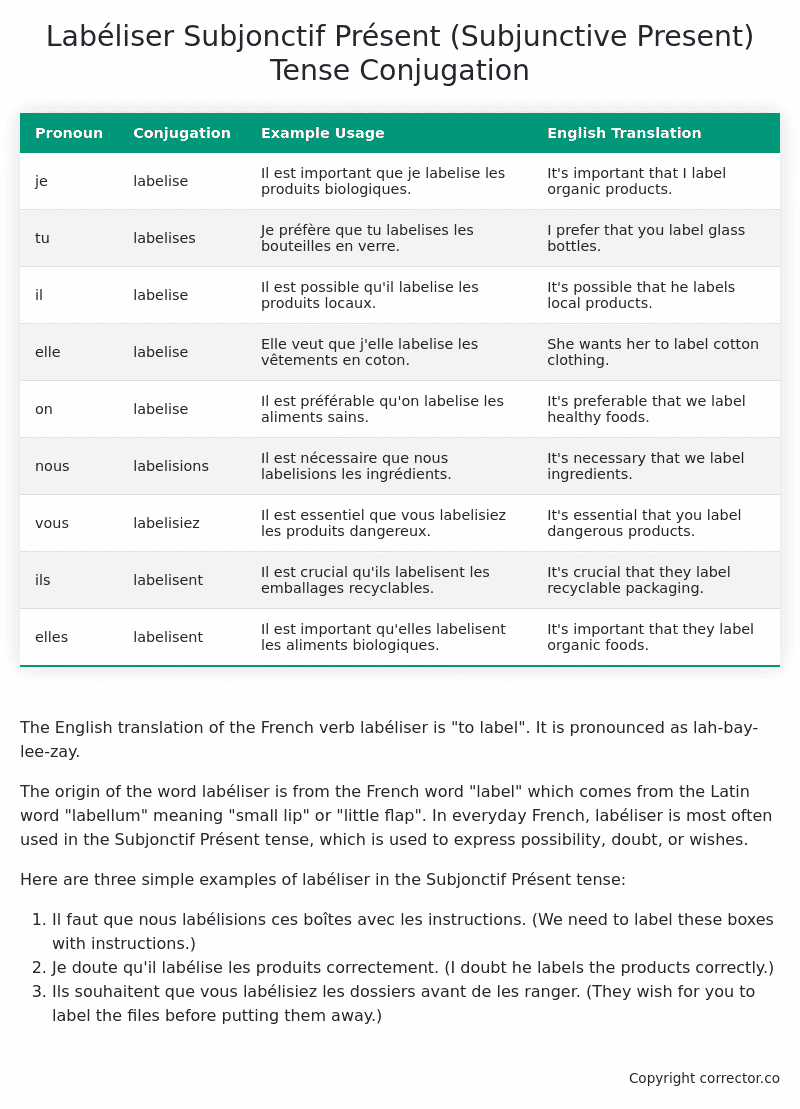Subjonctif Présent (Subjunctive Present) Tense Conjugation of the French Verb labéliser
Introduction to the verb labéliser
The English translation of the French verb labéliser is “to label”. It is pronounced as lah-bay-lee-zay.
The origin of the word labéliser is from the French word “label” which comes from the Latin word “labellum” meaning “small lip” or “little flap”. In everyday French, labéliser is most often used in the Subjonctif Présent tense, which is used to express possibility, doubt, or wishes.
Here are three simple examples of labéliser in the Subjonctif Présent tense:
- Il faut que nous labélisions ces boîtes avec les instructions. (We need to label these boxes with instructions.)
- Je doute qu’il labélise les produits correctement. (I doubt he labels the products correctly.)
- Ils souhaitent que vous labélisiez les dossiers avant de les ranger. (They wish for you to label the files before putting them away.)
Table of the Subjonctif Présent (Subjunctive Present) Tense Conjugation of labéliser
| Pronoun | Conjugation | Example Usage | English Translation |
|---|---|---|---|
| je | labelise | Il est important que je labelise les produits biologiques. | It’s important that I label organic products. |
| tu | labelises | Je préfère que tu labelises les bouteilles en verre. | I prefer that you label glass bottles. |
| il | labelise | Il est possible qu’il labelise les produits locaux. | It’s possible that he labels local products. |
| elle | labelise | Elle veut que j’elle labelise les vêtements en coton. | She wants her to label cotton clothing. |
| on | labelise | Il est préférable qu’on labelise les aliments sains. | It’s preferable that we label healthy foods. |
| nous | labelisions | Il est nécessaire que nous labelisions les ingrédients. | It’s necessary that we label ingredients. |
| vous | labelisiez | Il est essentiel que vous labelisiez les produits dangereux. | It’s essential that you label dangerous products. |
| ils | labelisent | Il est crucial qu’ils labelisent les emballages recyclables. | It’s crucial that they label recyclable packaging. |
| elles | labelisent | Il est important qu’elles labelisent les aliments biologiques. | It’s important that they label organic foods. |
Other Conjugations for Labéliser.
Le Present (Present Tense) Conjugation of the French Verb labéliser
Imparfait (Imperfect) Tense Conjugation of the French Verb labéliser
Passé Simple (Simple Past) Tense Conjugation of the French Verb labéliser
Passé Composé (Present Perfect) Tense Conjugation of the French Verb labéliser
Futur Simple (Simple Future) Tense Conjugation of the French Verb labéliser
Futur Proche (Near Future) Tense Conjugation of the French Verb labéliser
Plus-que-parfait (Pluperfect) Tense Conjugation of the French Verb labéliser
Passé Antérieur (Past Anterior) Tense Conjugation of the French Verb labéliser
Futur Antérieur (Future Anterior) Tense Conjugation of the French Verb labéliser
Subjonctif Présent (Subjunctive Present) Tense Conjugation of the French Verb labéliser (this article)
Subjonctif Passé (Subjunctive Past) Tense Conjugation of the French Verb labéliser
Subjonctif Imparfait (Subjunctive Imperfect) Tense Conjugation of the French Verb labéliser
Subjonctif Plus-que-parfait (Subjunctive Pluperfect) Tense Conjugation of the French Verb labéliser
Conditionnel Présent (Conditional Present) Tense Conjugation of the French Verb labéliser
Conditionnel Passé (Conditional Past) Tense Conjugation of the French Verb labéliser
L’impératif Présent (Imperative Present) Tense Conjugation of the French Verb labéliser
L’infinitif Présent (Infinitive Present) Tense Conjugation of the French Verb labéliser
Struggling with French verbs or the language in general? Why not use our free French Grammar Checker – no registration required!
Get a FREE Download Study Sheet of this Conjugation 🔥
Simply right click the image below, click “save image” and get your free reference for the labéliser Subjonctif Présent tense conjugation!

Labéliser – About the French Subjonctif Présent (Subjunctive Present) Tense
Formation of the Subjonctif Présent
Common Everyday Usage Patterns
Interactions with Other Tenses
Summary
I hope you enjoyed this article on the verb labéliser. Still in a learning mood? Check out another TOTALLY random French verb conjugation!


